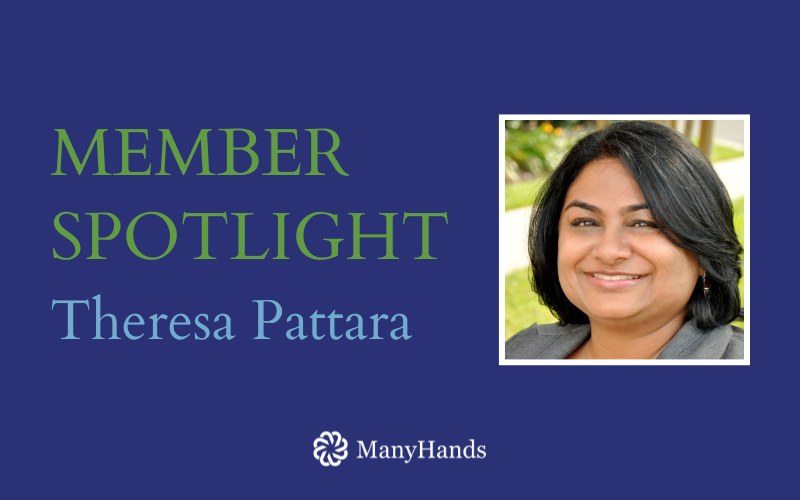Theresa Pattara is a public policy executive who is passionate about leveraging her expertise in charitable tax law and governance to advise organizations on their philanthropic endeavors, including fundraising and grantmaking. She joined Many Hands in 2020 and in 2022, served on the Economic Empowerment Committee and helped review applicant financials as a member of the Financial Review Committee. Always active in her community, Theresa recently joined the board of CASA/Prince George’s County, a 2019 Many Hands grantee, and has been an Administrative Volunteer with the Annandale Volunteer Fire Department, supporting fundraising and social media outreach, since 2021.
I know you are a longtime supporter of CASA/Prince George’s County, but could you talk a little about what motivated you more recently to become a fire department volunteer?
Around the twentieth anniversary of 9/11, in September 2021, I read an article about the volunteer fire departments in Northern Virginia and the critical role they played in relieving and backing up the Arlington, Fairfax County, and Alexandria fire departments, which were deployed to the Pentagon. I was truly dumbfounded to know that the DC metro area had volunteer fire departments—which I thought of only existing in small towns—like where I grew up in Pennsylvania. Having lived just a few miles from the Pentagon on 9/11, I will always remember and appreciate the sacrifices of first responders, and this is my way of not only honoring that but also ensuring the sustainability of my local VFD.
More broadly, where does your interest in community engagement come from?
I grew up volunteering; it’s always been in our DNA. My parents immigrated from India, and in particular, my grandfather and grandmother on my mother’s side were very involved in charity. My grandfather was the one of the first people in his family and village to attend college and continued on to graduate from law school. As he achieved success, he always believed in looking back and helping others. He promoted economic development in the village he was from, including funding a local library, and supported education for his kids and nieces and nephews. So, I grew up with that culture of giving back. Rather than just cut a check, which is easy to do, I firmly believe in being part of the community and getting to know people. I want to give time and build community as well as have a financial impact.
What were you looking for when you joined Many Hands?
I was really looking forward to the opportunity to meet women in the DC area who feel the same way about giving back. From a public policy perspective, I was aware of collective giving circles. Sowhen I learned about Many Hands, I joined even though it was the middle of the pandemic. Because of COVID, there haven’t been as many opportunities to meet new people and network, but I hope that will be easier in the future.
What most appeals to you about the Many Hands model?
Definitely, the impact of a $1,000 donation being multiplied many times over. I am aware of how difficult it is for small organizations to raise money and know how impactful a $100,000 or $50,000 grant can be for them. I love that amplification effect. I also love the fact that the funds are contributed by successful women!
Is there anything that stands out about your Many Hands experience?
I was impressed by how in-depth and respectful the review process is. Everyone was really engaged and interested to learn more, even those who didn’t serve on committees but attended the annual meeting. Everyone was very focused on how to choose among all these great organizations. Considering just last year’s applicants, I don’t know which one I would have picked if I had had to do it on my own. They were all wonderful organizations. There wasn’t one I felt didn’t deserve the money. I voted for one, but I knew I would be happy with whichever one got the money.
—Interview by Mary Kwak


